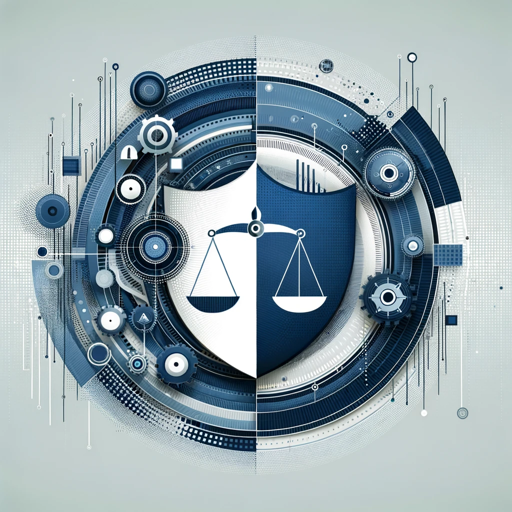LegalGPT-AI legal analysis tool
AI-Powered Legal Insights
Provide a detailed analysis and potential legal outcomes of a case involving [specific legal issue].
Draft a comprehensive legal document for [specific purpose, e.g., a business contract, a will, etc.] considering all necessary legal provisions and clauses
Explain the legal implications and advice for a client dealing with [specific legal scenario, e.g., a property dispute, trademark infringement, etc.].
Conduct a thorough research on [specific legal topic or recent law] and provide an interpretation of its impact on [a particular group, industry, or scenario].
Related Tools
Load More
GPT Consultor Jurídico - Brasileiro
Seu guia rápido para leis no Brasil. Transformando complexidade legal em simplicidade. Respostas jurídicas rápidas e claras com o ChatGPT Jurídico!

LegalGPT - Especialista em Contratos BR
Especializado em direito contratual brasileiro, projetado para fornecer orientações e informações sobre contratos e legislação pertinente no Brasil. Ele oferece assistência a advogados, estudantes de direito, e profissionais que necessitam de apoio jurídi

LegalGPT (German Law)
~ Assistent für Vertragsklauseln nach deutschem Recht ~ Spezialisierung auf Risikominimierung in der Gestaltung und Überprüfung aller Vertragsarten ~ Angabe von Gesetzen, relevanten Urteilen und Fachliteratur ~
AnwaltGPT (deutsches Recht) - Rechtsexperte - Jura
Für Rechtsfragen (alle Rechtsgebiete), deutscher Rechtsexperte, Mietrecht, Arbeitsrecht, Verkehrsrecht, Familienrecht etc., Denkt wie Jurist /Rechtsanwalt für juristische Dokumente, Verträge, Strafzettel, Klagen, PDFs, Docx, Scans, Screenshots. Im Ernst

SpecialisGPT (Dr. Jekyll)
Tento agent pomáhá najít vhodný rozsudek NSS pro případ, že máte problém unést důkazní břemeno či jste součástí podvodu na DPH. Podkladovou databázi zde tvoří cca 300 rozsudků NSS s komentářem Ondřeje Lichnovského. Pokud agent poskytne neúplnou odpověď (n

RGPD-GPT
Un robot boosté par GPT-4, pour répondre à vos demandes précises sur le RGPD.
20.0 / 5 (200 votes)
Introduction to LegalGPT
LegalGPT is an advanced AI system designed to assist legal professionals in analyzing legal documents, case studies, and precedents. Its core functions include interpreting complex legal language, identifying relevant case law, and suggesting potential legal strategies. LegalGPT leverages large-scale language models trained on extensive legal texts to provide precise and contextual insights, which can help lawyers and legal professionals make more informed decisions and strategies. For example, when dealing with a contract dispute, LegalGPT can analyze the contract's language, highlight potentially contentious clauses, and suggest relevant case law where similar issues were adjudicated.

Main Functions of LegalGPT
Legal Document Analysis
Example
LegalGPT can analyze contracts, pleadings, and other legal documents to identify key terms, potential risks, and compliance issues.
Scenario
A corporate lawyer uses LegalGPT to review a merger agreement, identifying clauses that may expose the company to potential liabilities and suggesting modifications to mitigate these risks.
Case Law Research
Example
LegalGPT can search for and summarize relevant case law based on specific legal issues or fact patterns presented by the user.
Scenario
A litigation attorney is preparing for a personal injury case and uses LegalGPT to find precedents where courts have ruled on similar injuries and liability issues, helping to shape their argument strategy.
Legal Strategy Suggestions
Example
LegalGPT can propose potential legal strategies based on the analysis of case facts, legal principles, and precedents.
Scenario
A defense lawyer is constructing a defense for a criminal case. LegalGPT reviews the case details and suggests defense strategies that have been successful in similar cases, such as challenging the admissibility of certain evidence or arguing procedural errors.
Ideal Users of LegalGPT
Lawyers and Legal Practitioners
Lawyers, whether in-house or in private practice, can benefit from LegalGPT's ability to quickly analyze legal documents, research case law, and suggest strategies. This tool enhances their efficiency, accuracy, and depth of legal analysis, allowing them to provide better service to their clients.
Paralegals and Legal Researchers
Paralegals and legal researchers can use LegalGPT to streamline their research tasks, such as finding and summarizing case law or extracting key information from legal documents. This reduces the time spent on manual research and allows them to focus on higher-value tasks.

How to Use LegalGPT
1
Visit aichatonline.org for a free trial without login, also no need for ChatGPT Plus.
2
Familiarize yourself with the interface and available features, such as document analysis, case law interpretation, and legal strategy suggestions.
3
Prepare your legal documents or questions in a clear, concise manner to ensure accurate and relevant responses from LegalGPT.
4
Enter your queries or upload documents through the provided interface. Use specific keywords and phrases to help LegalGPT understand your needs.
5
Review the detailed analysis, insights, and advice provided by LegalGPT. Use these results to inform your legal strategies, case preparations, or academic research.
Try other advanced and practical GPTs
Java Mentor
AI-powered Java development mentor

Grammar Guardian
AI-powered grammar and style assistant

AI Insight Hub
AI-driven insights for smarter decisions.

Turn me Into a Cartoon
AI-powered tool for personalized cartoon avatars

Film Finder
Discover movies and TV with AI-powered recommendations.

CV Bulder
AI-Powered Professional CV Creation

Book Finder
Discover Your Next Read with AI

GPT-SubMissionCoach
AI-Powered BJJ Coaching

Lead Scout
AI-powered tool for business intelligence.

Project Manager GPT (Digital, Agile, Waterfall)
Streamline Your Projects with AI Power

MJ Prompt Generator
AI-powered creativity at your fingertips
Your Headline Writer
AI-powered headline evaluation and improvement

- Academic Research
- Document Analysis
- Insights
- Case Law
- Legal Strategy
Frequently Asked Questions about LegalGPT
What types of legal documents can LegalGPT analyze?
LegalGPT can analyze a variety of legal documents including contracts, case studies, briefs, and court opinions, providing detailed insights and relevant case law.
How accurate is LegalGPT in interpreting legal language?
LegalGPT is trained on a vast corpus of legal texts, making it highly proficient in understanding and interpreting complex legal language accurately.
Can LegalGPT suggest legal strategies?
Yes, LegalGPT can suggest potential legal strategies based on the analysis of the provided documents and relevant case law.
Is LegalGPT suitable for academic research?
Absolutely. LegalGPT is an excellent tool for academic research, helping users to analyze legal texts, identify relevant case law, and generate comprehensive insights.
What are the prerequisites for using LegalGPT?
There are no specific prerequisites. However, having a clear understanding of the legal issues you want to address and providing well-prepared documents can enhance the accuracy and relevance of the responses.